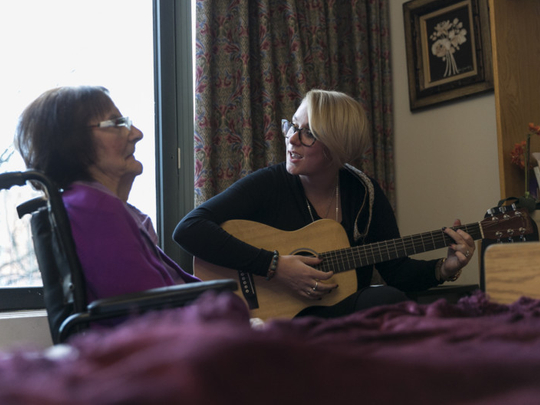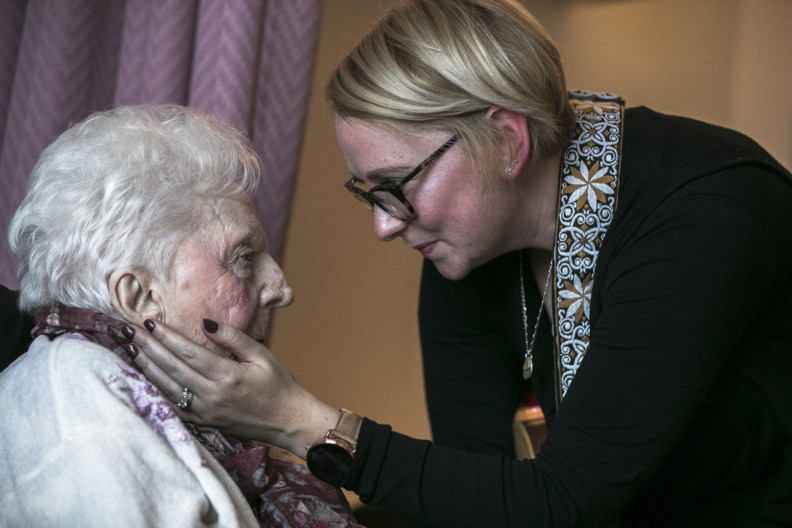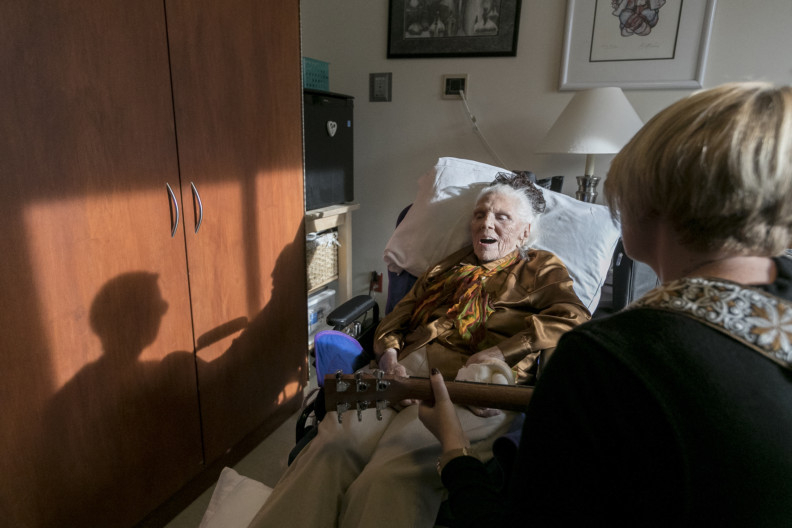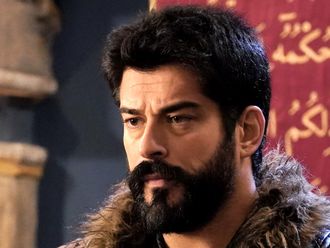
NEW YORK: At 90, Beverly Herzog is writing songs for the first time.
Once a week, a music therapist helps Herzog transform her thoughts into lyrics, then sings them back to her mellifluously over the strums of her guitar. The result can be transformative. When Herzog listened during a session in December, she marvelled at how magically the music reflected her views on love and life.
“I can’t believe it,” Herzog said in her room at the Hebrew Home at Riverdale in the Bronx. “So I sit with my mouth open, I do. And I’m starting to get an appreciation, not just swallowing it,” she added. “Not because it’s a song that we wrote together, but because it feels, like, complete, for all of us.”
Suffering from memory loss, Herzog can sometimes be confused. In her session, she told her music therapist, Kaitlyn Kelly, that her husband, Bernie, was coming to visit, but he is not alive. She talked about her job taking her away from her family, although she has lived at the home since 2013.
But about her songs, she is not confused. She offered detailed edits.
“Where it says, ‘I’m getting old’, it should say, ‘I’m getting older’,” Herzog told Kelly about a line in a song titled simply, The Song. “Because I am getting older now. And it is hard work.”
And the songs helped her remember her loves. “When we were singing, my father’s face was there,” she told Kelly after her song Family First. She wished her mother, more than anyone, could hear her repertoire, which now consists of four songs. “She’d be sitting here crying, she would be so proud,” she said.
Creation and loss
End-of-life music therapy also includes work being done by people such as Kristen O’Grady, a music therapist who works with terminally ill children and their families at the Elizabeth Seton Paediatric Center in Yonkers. She helps parents sing to their children, records the children’s sounds, and helps parents write and record lullabies.
“When we talk about end-of-life work, we are talking about loss,” O’Grady said. “But music is an inherently creative process. So we are directly opposing this feeling of loss with a feeling of creation. We are having creative, new experiences even in the last moments of someone’s life.”
At the Hebrew Home, which has 735 residents, Kelly is the sole creative arts therapist who specialises in end-of-life care in a team of 12 art, drama, movement and music therapists. She is most often called in when patients are judged to have six months or less to live to help them frame their lives and provide support. About one-third of her 10-15 current patients, she said, are regularly able to write songs with her, a process in which Kelly sets their thoughts to melodies she improvises. Others listen.
In a session with Grace Sullivan, who is 102 and has profound hearing loss, Kelly asked if she wanted to hear music. “Something sweet and low,” she said in a raspy voice. Kelly sang Qué Será, Será (Whatever Will Be, Will Be), as performed in 1956 by Doris Day.
She and other music therapists working in end-of-life care often play music from when their clients were young, to help transport them back to a time when they were able-bodied. Sullivan, who was in a wheelchair, responded to Qué Será, Será by sighing in rhythm to the music. Kelly started sighing too, to reflect back to her feelings and deepen them.
“How do you feel, Grace?” she asked afterward. “Good, I feel good,” she said.
Positive response
For Shirley Weinrich, 83, who has Alzheimer’s disease, she played relaxing music, and improvised some lyrics. “When you’re smiling, it’s so bright,” Kelly said, trying to get a smile.
Relatives who have been at sessions are sometimes shocked. Jeffrey Schecter, 44, whose mother, Joyce, died at the Hebrew Home in October, recalled a visit near the end of her life when Kelly was playing a Jewish folk song, which Schecter loved. She had been fairly unresponsive that day, because of advanced dementia.
Then Kelly started to sing Hava Nagila, “and my mum starts joining in, and this strength was coming from somewhere, and she was belting [out] Hava Nagila. I just stood back and actually filmed some of it”, he said.
“It was like she couldn’t help but do anything but join in. It just brought me to tears, because I hadn’t seen that kind of energy for a while.”
It is a memory he cherishes.
“I remember leaving that day, thinking if that’s one of the last times I see my mum, you can’t beat that,” he said.
He invited Kelly to play at his mother’s funeral, and she sang Hava Nagila at the cemetery.
When another resident, Jose Reyes, died in 2016 at age 100, Kelly gave his daughter a CD of the song he had written, All We Have Is Today. His daughter, Alida, read the lyrics at the funeral. “We remember our yesterdays/All we have is today/We don’t know if we have a tomorrow/All we have is today,” the chorus goes.
—New York Times
News Service














